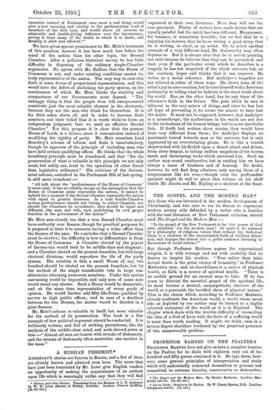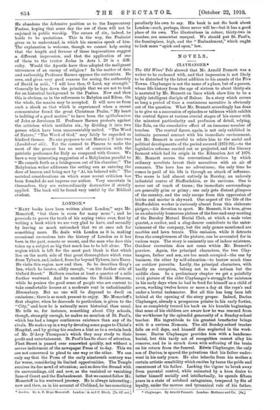PROFESSOR BARNES ON THE PSALTER.t PEorEsson BARNES does not give
us here a complete treatise on the Psalter, for he deals with eighteen only out of the hundred and fifty poems contained in it. He lays down, how- ever, some general principles of interpretation and study which will undoubtedly commend themselves to persons not committed to extreme theories, conservative or destructive..
• The Gospel and the Modern Man. By Shaller Mathews. London: Disc. millan and Co. [6s. 6d. net.] f Les in Cords : Studies in the Psalter. By W. Emery Barnes, D.D. London: Longman and Co. [51. net.] He abandons the defensive position as to the Imprecatory Psalms, hoping that some day the use of them will not be enjoined in public worship. The curses of cix., indeed, be holds to be quotations. This is the way, the Psalmist gives us to understand, in which his enemies speak of him. The explanation is welcome, though we cannot help seeing that the length and fervour of these imprecations suggest a different impression, and that the application of one of them to the traitor Judas in Acts i. 20 is a diffi- culty. Would the Apostle have thus adopted the malignant utterances of an enemy of religion ? In the matter of date and authorship Professor Barnes opposes the extremists. He sees, and gives very good reasons for seeing, the authorship of David in xviii., " I will love thee, 0 Lord, my strength." 'Generally he lays down the principle that we are not to look for an historical background to the Psalms. Now and then this is obvious, as in the references to Babylon and Edom. On the whole, the maxim may be accepted. It will save us from such a shock as that which is experienced when a recent -commentator found the great Christmas Psalm, " My heart is inditing of a good matter," to have been the epithatamium of Jehu or Jeroboam II. Professor Barnes protests against the criticism which mutilates xix., by dividing it into two poems which have been unaccountably united. " The Word of Nature," "The Word of God," may fairly he regarded as kindred themes. No one proposes to cut Horace i. 9 into two (Laudabunt Yet the counsel to Plancus to make the most of the present has no sort of connexion with the 'patriotic preference for Italy as compared with Greece. We have a very interesting suggestion of a Babylonian parallel to -"He cometh forth as a bridegroom out of his chamber." The Babylonian writer addresses the setting sun as entering the -door of heaven and being met by "Ai, his beloved wife." The metrical considerations on which some recent criticism has been founded do not impress our author. Very uncertain in themselves, they are extraordinarily destructive if strictly applied. The book will be found very useful by the Biblical student.















































 Previous page
Previous page